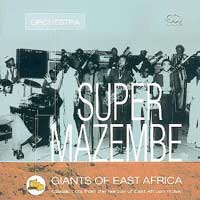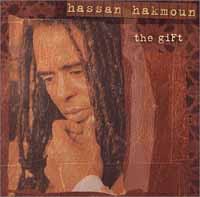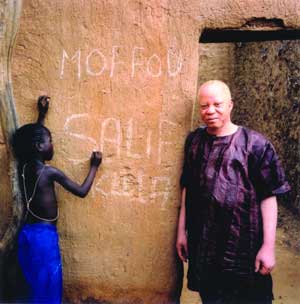
|
Listen while you read |
Mali Classics | Super Mazembe | Roadmaster | Hassan Hakmoun | Salif Keita | Angelique Kidjo
|
For the really serious African music aficionados only--do check out three golden oldies that will turn you upside down. Foremost is the classic Mali Stars Vol. 1 (Melodie, 1975) by the famous Rail Band featuring Salif Keita and Mory Kante, two young men who are destined to greatness, and who in a quirky way share history that dates back 700 years when Soundiata Keita (Salif's ancestor) fought the powerful Sumagoro Kante (Mory's ancestor) and established the Mandingo Empire. All this is laid out in a sprawling song Soundiata (28 minutes long) in which Mory Kante recounts the story while Djelimady Tounkara and Djeli Moussa Koite lay out the lilting guitars. Moussa Kone is loud on the trumpet and Dramane Koumare is unrelenting on the tumba and the bongo. There is elegance and majesty in the music, and while it's more spoken language than sung, there is no mistaking the deep soul of the music which grabs you until the very climax. Regardless of how grouchy he is, my four-year old son will jump up to dance the entire length of the music and crack a smile. If you must walk to Timbuktu for this one, do it.
Sweet old highlife music finds a new lease on life in the album "The Old Highlife" (Art Hurts Records), a recording made after the reunion of two old masters from Ghana's music scene of the 1960's-- Roadmaster (vocals) and Nana Opoku Agyemang (guitar). The tracks on this album may have been penned a half-century ago, but the new arrangement under the keen guidance of the veterans aided by American musician Beston Barnett, adds a certain urgency, spring and jest to the music. The tempo is upbeat as highlife flows smoothly into soukous and into Benga and back to highlife. The singing is richly matched with warm, robust guitars and drums, adding that irresistible joie de vivre to the mix. However, the real bonus is the modern recording equipment that brings singular clarity to the album--listen to the classic tune Yaa Amponsah, Akwasi Broni and Awurade (my favorite as it takes on an old Zaiko Langa Langa tune and turns into a real dance number). Recorded in Kumasi, and mastered in the USA, this album should be easily available. Now for the New Stuff from the Desert Pure load of fun is the best way to describe "Tea in Marrakech" (Stern's/Earthwork) compilation of various contemporary artists from Morocco, Algeria, Tunisia, Egypt and Sudan. From the opening track Salam by front man for Orchestre National de Barbes to the fifteenth track titled Zmane Y Dore by Sawt El Atlas, this album truly rocks with the best music from Arab North Africa. Whether fortuitous or by design, all the tracks chosen for this album play heavily on the traditional Arab ballads, pushing to the very front the very best of joyful wedding and celebration music. There is something here, a thread that strings these different music together so that they speak to the listener as if in unison with one heartbeat. There is carefree abandon, a worldly acceptance of the different experiences around you and turning all negative forces into good energy--OK, I realize that this sounds too deep. What I am really getting at is that Tea in Marrakech is a total experience that is the next best thing to being there in person, sipping tea under the overhanging balcony while listening to the sound coming from the street, the sky and from all around you. In this album you can smell the sweet fragrance, the fetid sweat, the welcoming aroma of curry and taste the very nectar of modern Arab culture. Surely, you can lose yourself into this music, which may not be a bad thing at all. Take for instance the snappy reggaesque tune Poulina by ONB--even as the deep bassline says reggae, the lyrics and the accompanying melody remain true to Algerian rai music scene, complete with very raucous trumpet and lively chorus. Try the hand-clapping, feet-stomping title track, Tea in Marrakech by Hamid Baroudi with its very modern arrangement, but completely traditional beat and lyrics. The very next two tracks--Hna Mada Bina by Freres Bouchenak and Ellila Materfrach by veteran singer rai queen, Chaba Zahouania--sparkle with god vibes. And for that matter, from Tunisia, check out Faouzi Ben Guamra's Enjibek, Enjibek with its sweet sintir and innocent chorus line. True, we do step out of the strictly Arabesque culture into Sudanese Setona's Tarazina which sounds more East African. But this only heightens the senses to the different nuances of music from the desert.
Perhaps, Hakmoun's greatest gift is his ability for translating a very foreign sound into something that is completely universal while, at the same time, remaining very authentic to the original spirit of the music. The album gets on shaky grounds every time it becomes too ambitious in attempting to meld many disparate sounds into one--only then a few cracks appear in the fabric. A King, A Queen and the Cesaria Evora Connection.
But it's in the reflective, self-absorbed tracks such as Iniagige, Katolon and the self-accompanied tracks Souvent and Ana na Ming, that Keita demonstrates his appeal as vocalist whose cry and laughter travel far. In that voice one discerns sadness, happiness, doubt and angst all twisted tightly into a multi-colored emotion. Here we see Keita at his most vulnerable even as his songs carry within the power to move. The embellishment of the music with the tabla drums adds to the mysticism and spiritualism that have been part of Keita's allure. With this album, we finally get close to Keita--at least that's the feeling that you get as you play the album over and over again. Probably the best album since Keita burst onto the scene with Soro (Mango, 1987). The other artist finally comfortable with self is Angelique Kidjo's. Her latest album "Black Ivory Soul" (Sony Music, 2002) truly allows her to let go of the showy side of the business to focus on the exploration of the soul of the craft. The sheer variety of style alone is enough to make this album a success--but Kidjo is not satisfied with merely having been there; she must feel it, roll it on her tongue and make it real. Consequently, the album brings together those elements of Brazilian, African and western music in a pleasant, feel good, though gritty union. The carefree search allows her to touch Cesaria Evora's (also Brazilian Choro) specialty called mourna, a bit of hip-hop, jazz, R&B and even a go at Tuku music as in Zimbabwe's Oliver Mutukudzi whose style is reflected in the tune Iwoya. But as always, Kidjo makes everything very original, insisting on perfection on all of the songs, and carefully arranging space and color so that her luscious voice takes flight on center stage. There are those beguiling tracks like Bahia, Olofoofo, and Okan Bale where Kidjo is floating on a cloud and we follow her there. Only to be brought to the real world with earth-shaker like Iwoya, Tumba, Black Ivory Soul, Rafavela, Afirika, on which Kidjo is totally transformed into a fearless she-leopard galloping to the hunt, and watch out because she takes absolutely no prisoners. The album merely confirms what started over decade and half ago in Benin, namely that Kidjo is more than an artist--she possesses the very spirit that leads her beyond new frontiers, allowing her to become the child of the earth.
CDs available from cdRoots:
CDs available from cdroots.com: Roadmaster available from Art Hurts |
Opiyo Oloya is the host of the radio program Karibuni on CIUT 89.5 FM Radio, Toronto. The show airs on Sunday, 6:00 PM- 8:00 PM. CUIT is now available via Real Audio G2 at www.ciut.fm
E-Mail: [email protected]



